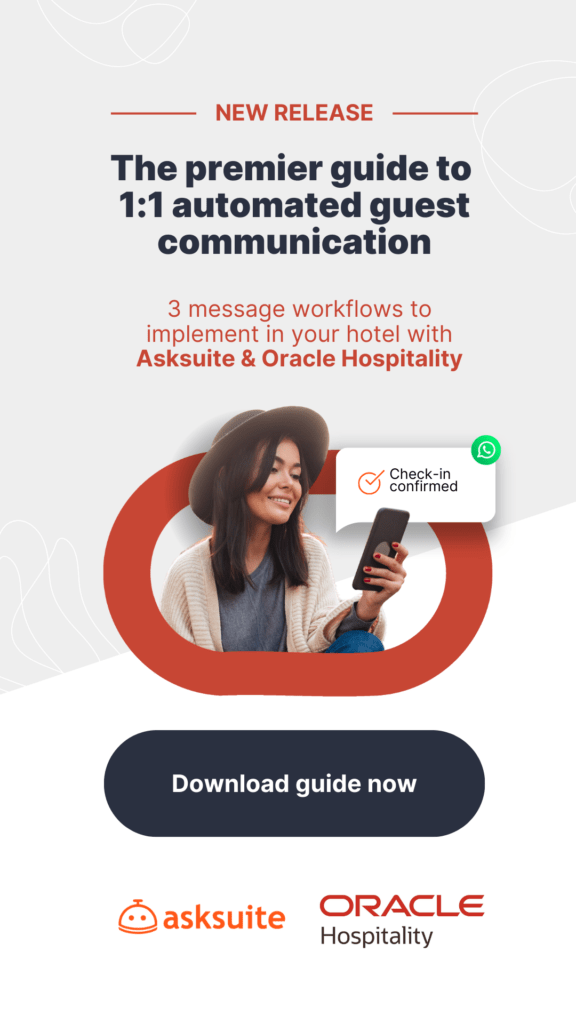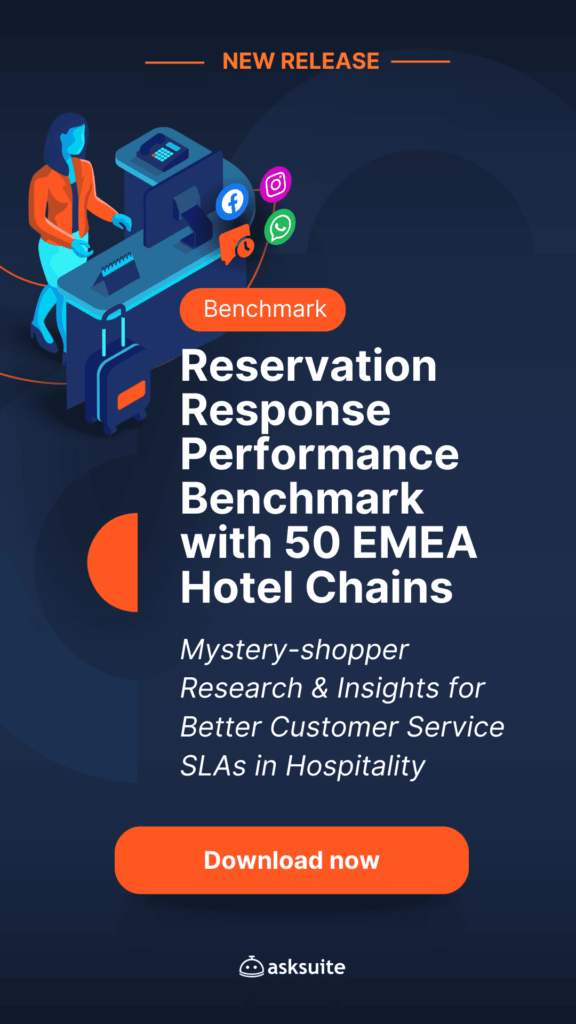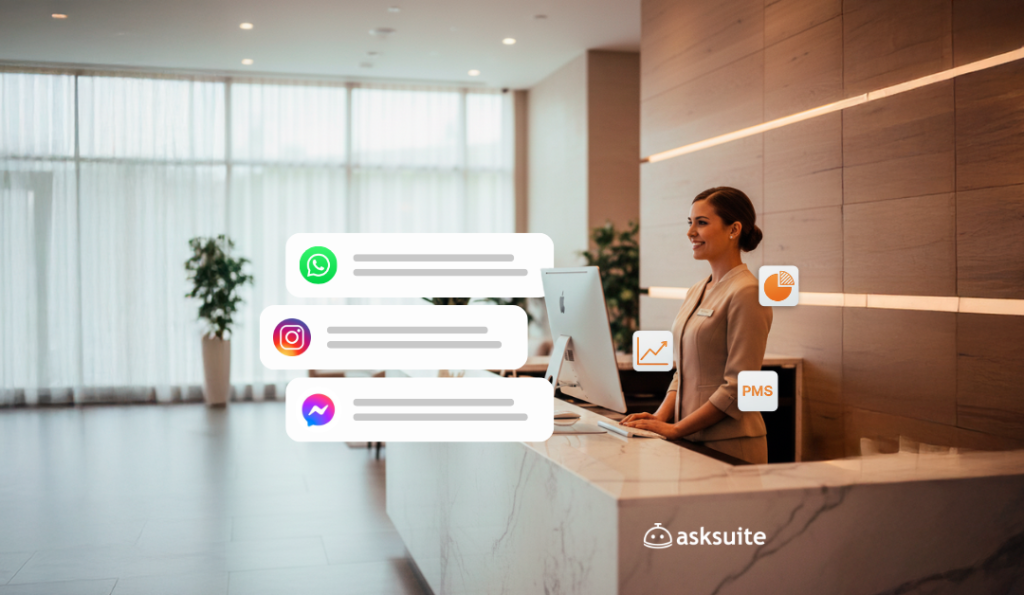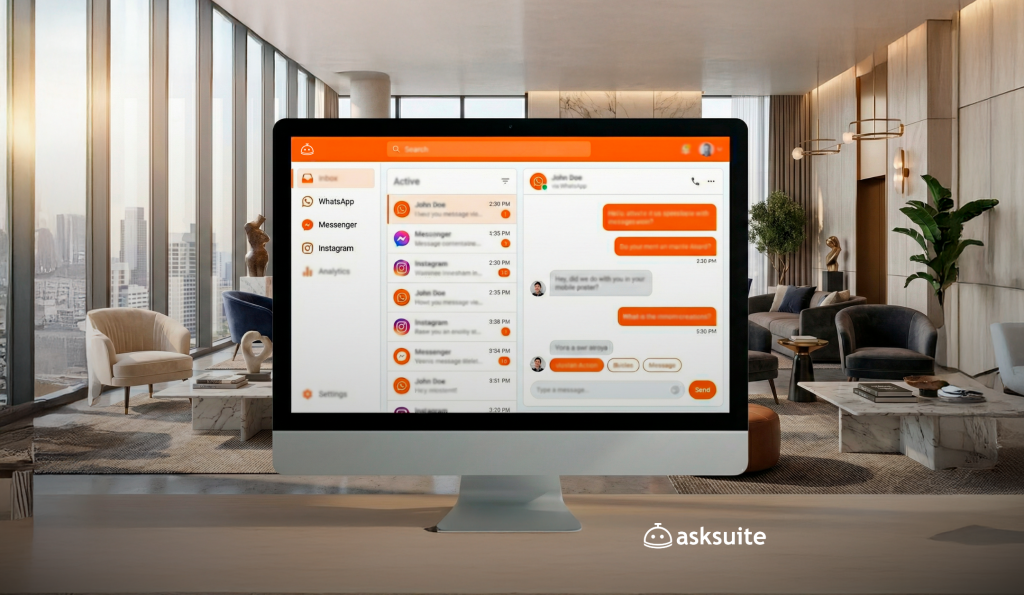Your reservation team should be closing sales, not repeating the check-in time. Discover how hospitality-specific AI helps hotels respond faster and smarter
In most hotels, the reservation agents wear many hats: they’re salespeople, customer service reps, and sometimes even concierges. But far too often, their time is consumed by repetitive questions like “Do you have parking?” or “Can I check in early?”
These questions are valid because they can lead to booking confirmation but answering them over and over pulls your team away from what really matters: handling complex negotiations, following up with warm leads, and delivering exceptional service that converts.
The reality is simple: if your agents are still manually answering the same questions every day, you’re leaving both time and money on the table. That’s where specialized AI for hotel customer service comes in, streamlining responses, improving efficiency, and giving your team the space to focus on what humans do best.
5 traveler questions that specialized hospitality AI can handle
Generic chatbots often fail in hospitality because they don’t understand the nuances of the industry. They can misunderstand some specific concepts and generate vague, frustrating answers that cause more work for your team and pull travelers away.
That’s where specialized AI, trained specifically for hotels, makes all the difference.
Hospitality AI is built to understand the language of travelers, the structure of hotel services, and the context behind each question. It doesn’t just answer; it reassures, informs, and guides the traveler, all while following your hotel’s policies and tone of voice.
Below are 5 categories of questions that hospitality-trained AI can handle with confidence, accuracy, and efficiency, freeing up human agents to focus on where they’re truly needed.
1. Hotel policies (the rules everyone asks about)
Policies are among the most common, and repetitive, inquiries hotels receive. Travelers want to know about pets, smoking areas, early check-in, and cancellation terms before they commit to booking. These questions are essential for decision-making, but the answers are usually fixed and rarely require human intervention.
That’s exactly where AI shines. Specialized hospitality AI can instantly provide accurate, policy-based responses that reflect your hotel’s tone of voice and brand personality. It ensures that every traveler receives consistent, up-to-date information without your team having to type the same message hundreds of times a week.

2. Services and amenities (what the hotel offers)
Potential guests are often curious about what’s included in their stay and what comes at an additional cost. Questions about breakfast, parking, spa access, or pool hours pop up constantly, especially during the discovery phase when travelers are comparing options.
The good news? These services usually have standardized descriptions, hours, and fees, making them perfect candidates for AI automation.

Hospitality-trained AI can answer these questions instantly and clearly, eliminating unnecessary wait times and giving travelers the confidence to move forward with their booking.
Even when a service has nuances, like spa availability or valet pricing, AI can provide detailed, accurate responses based on your hotel’s data, reducing back-and-forth and keeping agents focused on sales-critical tasks.
That’s why you need to make sure the AI communication platform your hotel uses can receive different formats of personalized inputs and has a great understanding rate, which will generate accurate answers.
3. Accommodation details (what’s in the room)
Room features are deal-breakers for many travelers. Whether it’s a bathtub for relaxation, a workspace for business, or simply a hairdryer, travelers want to know exactly what they’re getting, before they click “Book now.”
But replying to these types of questions repeatedly can eat into your team’s time, especially when the details are consistent across room types.
Specialized hospitality AI can be trained with your exact room descriptions, amenities, and even photos, enabling it to deliver fast, accurate answers tailored to the traveler’s request.

Beyond saving time, this kind of personalized, helpful reply can keep a traveler engaged, boost trust, and even nudge them toward an upgrade, all without needing a human to jump in.
4. Location and surroundings (what to do nearby)
Location is one of the top deciding factors for travelers. They frequently ask about proximity to beaches, event venues, tourist attractions, or public transport. These questions might seem casual, but they often signal serious interest and timing is everything when a traveler is making comparisons.
The answers are typically factual and unchanging, making them easy for AI to handle. Hospitality-focused AI can provide precise, contextual directions and recommendations that help position your hotel as the ideal choice.

This kind of response does more than answer a question, it creates a mental map for the traveler, helping them visualize their stay. And when they get this information instantly, without delays, they’re more likely to stay engaged and move forward with booking.
5. Quotes and availability (the start of the sale)
When a traveler asks for pricing or availability, it’s a strong buying signal and speed matters. The longer it takes to respond, the more likely they are to check another site or book elsewhere.
Yet many hotels still handle these requests manually, even when the information exists in their booking engine. This creates unnecessary delays and increases the workload on reservation agents.
With real-time integration between an AI Reservation Assistant and the booking engine, AI can check rates, availability, and room categories instantly. It responds 24/7, even outside office hours, keeping the sales process moving without friction. And there’s more: travelers who have already decided to book can finalize the reservation on their own in a frictionless process.

This approach keeps the traveler engaged at the exact moment of interest, maximizing your chances of converting curiosity into a confirmed booking.
Pro tip: Implement a tech solution capable of offering alternative options in case of limited availability. This is essential for retaining potential guests and showing them your hotel is committed to providing viable possibilities.
The real benefit: Letting humans do what they do best
AI excels at handling the repetitive and predictable. But when it comes to empathy, persuasion and creativity, humans are irreplaceable.
By automating standard inquiries, hospitality AI doesn’t just make communication more efficient; it creates space for your team to focus on the moments that truly matter.
Immediate reduction in wait times (24/7, 365-day service)
By providing instant responses at any time or volume, AI enhances traveler engagement and satisfaction. It ensures no opportunity is missed, particularly outside business hours or during peak seasons. This is also crucial for internal efficiency, as it prevents reservation agents from becoming overwhelmed with routine inquiries, allowing them to focus on more complex, sales-related responsibilities.
Team focus on complex sales
By eliminating the need to reply to routine FAQs all day, your staff can dedicate their expertise to complex cases, like group bookings, events, and long stays with special requirements. Usually, these cases demand negotiation, customization, and detailed follow-up. This ensures their skills are applied where they truly add value.
More time for personalized service
A traveler celebrating an anniversary. A family arriving late with kids. A guest who is disappointed with their room. These are critical “moments of truth” that define the entire customer experience and a hotel’s reputation. Such situations demand empathy, creative problem-solving, and a genuine personal touch. This is how you build loyalty, secure repeat business, and create the five-star experiences that AI can support but never replace.
AI isn’t about replacing, it’s about empowering your team
Nowadays, hospitality can strategically blend AI and human talent. This creates the optimal environment for them to function as a single, high-performing team, where efficiency and personalized service thrive together.
When hotels automate the “obvious”, reservation teams are free to focus on the exceptional: converting leads, upselling with empathy, and building the kind of experience that earns loyalty (and glowing reviews).
By putting repetitive tasks on autopilot, you allow agents to operate at their full potential as strategic, persuasive, human professionals. And that’s where your hotel truly stands out.
Curious how AI can go beyond answering FAQs to actually guide travelers through the booking journey?
👉 Check out our complete guide to Conversational AI for Hotels and discover how to create faster, smarter, and more human-like interactions at scale.





